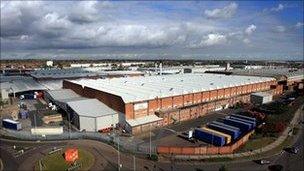Jaguar Land Rover rips up West Midland factory closure plan
- Published

Jaguar Land Rover wants to expand manufacturing capacity in the UK
Jaguar Land Rover's (JLR) decision to retain both its factories in Solihull and Castle Bromwich marks an extraordinary about-turn.
Only two weeks ago, at the Paris motor show, Carl-Peter Forster, chief executive of the Indian carmaker Tata Motors, which owns JLR, insisted it wanted to merge its West Midlands manufacturing, so one of the plants would need to be closed.
"The most efficient model is one large operation," he said at the time.
In any event, a factory closure would not have been about cutbacks, he stressed.
"Our ambition is to produce more rather than less," he said. "We will ultimately employ more people in the UK, not fewer."
Hence, closing either factory would have had a limited impact on staff, he insisted.
"Whether they come to one site or the other to work doesn't matter in my view," he said.
'Triumph for all'
Many of the workers disagreed, however, so the Unite union has been pushing for both factories to remain open during talks that have lasted about a year.
In the end it seems the union's arguments have won the day. Jaguar Land Rover now says it will retain its two plants in the West Midlands, as well as its Halewood operation.
"This is a triumph for all concerned," said Ralf Speth, chief executive of Jaguar Land Rover.

Mr Forster says cost must come down to secure Jaguar Land Rover's future
"We have ambitious plans for growth and the success of our products around the world and this agreement will allow us to accelerate and realise those plans."
JLR sales are already much stronger than they were a year ago. In September, JLR sold 19,528 vehicles, a 16% rise when compared with the same month last year. Sales growth was stronger for Land Rover, up 19%, than for Jaguar, up 10%.
During the April to September period, JLR sales rose 40% compared with the same period a year earlier.
"The prospects for JLR now that the workforce is fully on side are in my view excellent," says Howard Wheeldon, senior strategist at BGC Partners.
"We suspect that JLR has ample opportunity to continue growing market share.
"This is a well managed operation that has a well placed future strategy to match."
Lower pay
However, the search for cost reductions will not have gone away.
Mr Forster has always said he is prepared to listen to "proposals for other ways to get some efficiency", other than merging manufacturing operations.
Hence, it seems there will be a price to pay for keeping both the West Midlands plants open, and for securing masses of investment from parent company Tata in the years ahead.
That price will not be paid by those already working there. They will get a 5% pay rise in November, with a further rise of at least 3% a year later.
"Existing employees are unaffected," JLR said in a statement.
But the thousands of new workers that Jaguar Land Rover is planning to recruit over the months and years ahead "will come in on lower rates of pay and receive lower shift premiums", the company said in the statement.